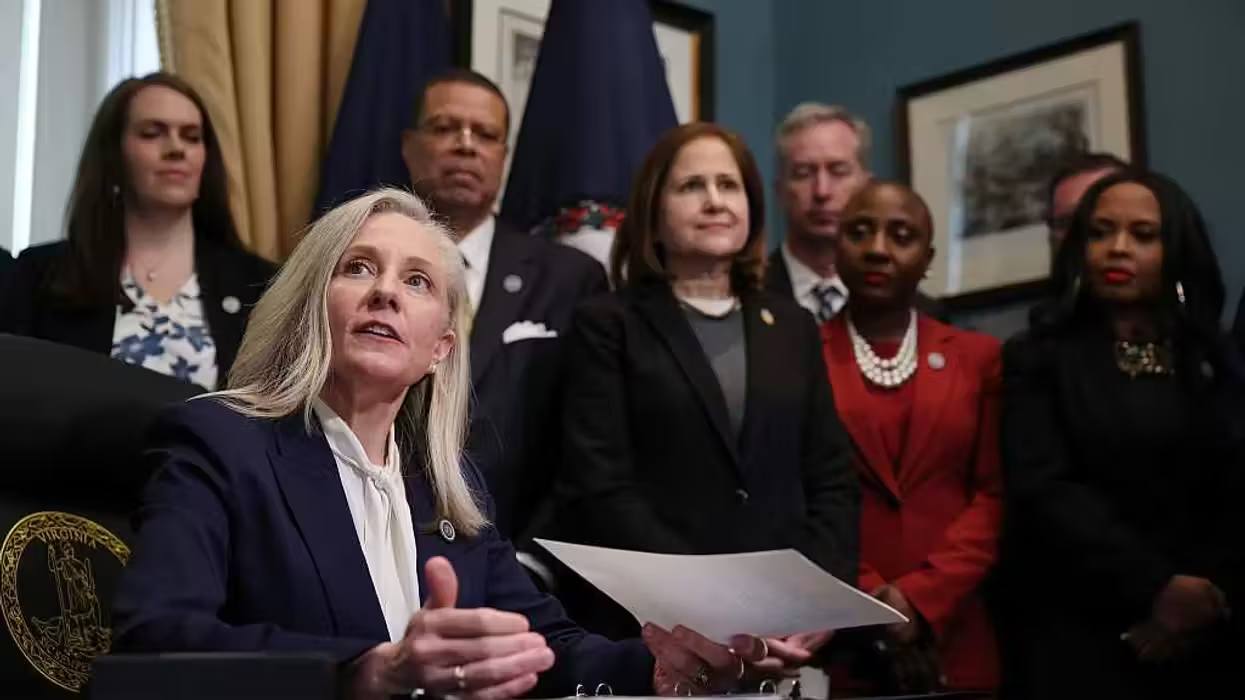
© 2026 Blaze Media LLC. All rights reserved.
 US President Barack Obama waves after taking the oath of office during the 57th Presidential Inauguration ceremonial swearing-in at the US Capitol on January 21, 2013 in Washington, DC. The oath was administered by US Supreme Court Chief Justice John Roberts, Jr. Credit: AFP/Getty Images
US President Barack Obama waves after taking the oath of office during the 57th Presidential Inauguration ceremonial swearing-in at the US Capitol on January 21, 2013 in Washington, DC. The oath was administered by US Supreme Court Chief Justice John Roberts, Jr. Credit: AFP/Getty Images
President Obama has an, at times, well-deserved reputation for delivering his speeches well. Certainly, the president made an impression today when he delivered his second inaugural address calling for a bolder, more expansive government that would be committed increasingly to the principles of liberalism, with characteristic soaring rhetoric.
Unfortunately, another characteristic was also in evidence in Obama's speech: namely, his tendency to argue against positions that nobody holds (and by extension, to mischaracterize his opponents' views so as to make them easier to argue against). In logic, this unfortunate tendency is referred to as a "straw man fallacy" and it was well-worn in President Obama's speech today - so well-worn that at times, he seemed to cough up a new straw man fallacy with every sentence. How many of these arguments in bad faith did the President use? Read on as we list each one and explain their fallacious nature.
Straw Man #1:
"For the American people can no more meet the demands of today’s world by acting alone than American soldiers could have met the forces of fascism or communism with muskets and militias."
The President's line about muskets and militias is a rhetorical flourish more than an argument, but the first part of this line is an obvious straw man. No one in the current political climate is arguing for a complete dissolution of government power such that only the American people as a collective would be responsible for defending the country or performing any other task. Rather, the question is how much responsibility should be left to private citizens. Saying "private citizens cannot handle all responsibilities" is not the same as saying "private citizens cannot handle any responsibility at all."
Straw Man #2:
"No single person can train all the math and science teachers we’ll need to equip our children for the future, or build the roads and networks and research labs that will bring new jobs and businesses to our shores."
Like the first straw man, this one argues against something which is obviously false, and which no one believes. A single, individual person obviously cannot do all of this alone, but again, that does not imply that if someone cannot do something alone, the government must step in and do it for them. For instance, an architect cannot build a skyscraper alone. He needs laborers, engineers, and other people. But saying he can't do this alone is not the same thing as saying that private citizens cannot cooperatively agree to do this without help from the government.
Straw Man #3:
"We reject the belief that America must choose between caring for the generation that built this country and investing in the generation that will build its future. For we remember the lessons of our past, when twilight years were spent in poverty and parents of a child with a disability had nowhere to turn."
No one is proposing completely giving up caring for older generations, nor is anyone proposing completely ignoring young people's needs. The question is how much government can afford to spend on each. More to the point, no one on either side is proposing complete abolition of programs that help the elderly or the disabled.
Straw Man #4:
"Some may still deny the overwhelming judgment of science, but none can avoid the devastating impact of raging fires and crippling drought and more powerful storms."
This straw man, which deals with global warming, is actually two fallacies in one. It is a straw man because no one believes they can avoid the impact of natural disasters completely, and it also begs the question by assuming that solving global warming will solve the problem of fires, drought and storms, while simultaneously trying to prove that by solving global warming, natural disasters will be lessened.
Straw Man #5:
"We, the people, still believe that enduring security and lasting peace do not require perpetual war."
The President's critics on national security do not believe in perpetual war. They may believe in seeing some wars through to their conclusion, or starting other wars out of necessity, but none of them believes in perpetual war for its own sake.
Straw Man #6:
"For our journey is not complete until our wives, our mothers and daughters can earn a living equal to their efforts."
People arguing against bills such as the Lilly Ledbetter Fair Pay Act, which claim to be devoted to ensuring equal pay for women, often do so because they are concerned that these laws give trial lawyers too much of an excuse to sue, not because they believe women should be underpaid.
Straw Man #7:
"Our journey is not complete until our gay brothers and sisters are treated like anyone else under the law, for if we are truly created equal, then surely the love we commit to one another must be equal as well."
Again, there are no mainstream political figures who believe that gays should be unequal before the law. In fact, gays enjoy all the same constitutional protections as straight people. The question of whether the right to marriage is one of those constitutional protections, however, is an unresolved question, though the Supreme Court may resolve it later this year. This straw man also assumes that the only function of marriage is to facilitate love. That is certainly one view, but it is not one that all critics of gay marriage subscribe to, and thus assuming that they oppose gay marriage out of opposition to love is a straw man.
Straw Man #8:
"Our journey is not complete until we find a better way to welcome the striving, hopeful immigrants who still see America as a land of opportunity."
Shutting off immigration completely is not a policy proposal being offered. What is being argued about is the question of what to do with people who immigrated to the US in contradiction to its laws.
Straw Man #9:
"Being true to our founding documents does not require us to agree on every contour of life. It does not mean we all define liberty in exactly the same way or follow the same precise path to happiness."
This is obviously true, but is also a straw man because no one believes that following a blueprint for governance requires the people following that blueprint to make all the same lifestyle choices. This is not even an argument that constitutional originalists on the Supreme Court advance. The President is arguing against a position that is not held by his critics.
That's nine straw men in slightly under 20 minutes. In other words, one logical fallacy every 2 minutes, on average.
Want to leave a tip?
We answer to you. Help keep our content free of advertisers and big tech censorship by leaving a tip today.
Want to join the conversation?
Already a subscriber?
more stories
Sign up for the Blaze newsletter
By signing up, you agree to our Privacy Policy and Terms of Use, and agree to receive content that may sometimes include advertisements. You may opt out at any time.
Related Content
© 2026 Blaze Media LLC. All rights reserved.
Get the stories that matter most delivered directly to your inbox.
By signing up, you agree to our Privacy Policy and Terms of Use, and agree to receive content that may sometimes include advertisements. You may opt out at any time.






